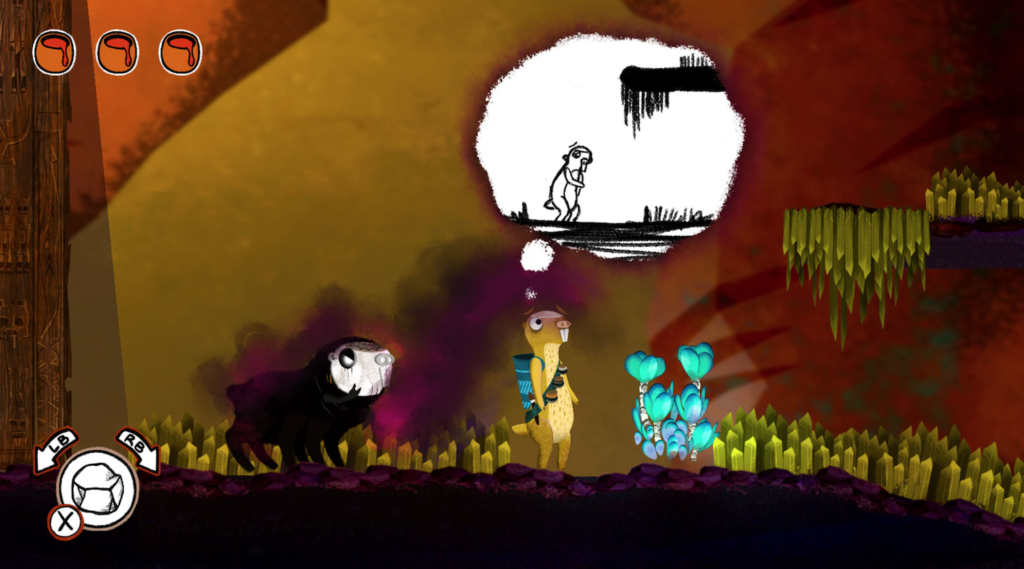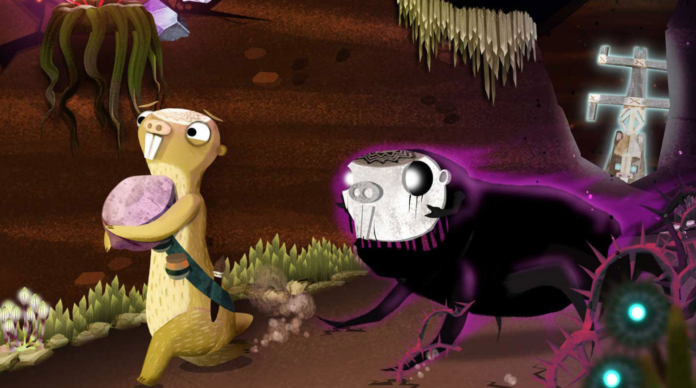When Kerstin Schütt of Twisted Rumble started making a video game about depression, she learned some valuable lessons along the way. She shared her insights during her talk at the Hamburg Games Conference.
Taking on games that deal with serious subject matters like depression can be a tight balancing act. You have to find a way to merge your serious message with gameplay that is enjoyable. No small feat. Schütt talked about what she did for her debut game Duru. ‘a game about mole rats and depression’.
Do your research.
This seems obvious, but it’s important to do research. Sure, you can start with a Google search but you need a solid foundation if you tackle a serious issue. So read books on the matter and find an expert to talk to. “It’s nice if the expert is also one of your friends, or maybe you could befriend an expert, so you can keep coming back for advice during development.”
Find first hand reports of people affected by your topic. If you read up on their cases, make sure to keep an eye out for hopeful and positive moments. These can become important for your game. Also, get info from organisations that deal with your subject.
Check out other games that deal with dark subject matters in a light way, like What remains of Edith Finch and Celeste.

What do you want to achieve?
Be very specific about the reason you want to make a game about that subject. People will often ask you why and you better have a good answer. And what do you want to achieve with your game? Raising awareness or explaining tough topics in a playful manner? Give advice or help affected people? All solid reasons, but important to know your own motivations. A clear goal can also help you with marketing later.
“Also if you develop a character with a mental disorder, make sure you do it for the right reason. There is always more that defines a character than their mental disorder. It’s not a character trait and should not be used in that way.”
Story & Mechanics
Let your research and goals guide the development of the story and mechanics. Find the most common or significant aspects of your topic and make them part of the story and the game mechanics. Don’t try to fit all aspects of your topic in the game, because that can distract the player from your message.
“In the case of our game Duru, we identified the common description people had of their depression. They call it an invisible monster that is always there and follows them around. We translated that to the AI companion Bel that follows the main character Tuli around and sabotages her actions. We also use it as a storytelling device to show players how this creature is manipulating Tuli’s thoughts and actions.”

Make it colorful
Twisted Rumble set the goal to make a fun game about a serious subject. That’s why they chose animal characters (mole rats) and light hearted hand drawn graphics. “Here you can use the hopeful and positive moments you found during your research. Don’t be afraid to use humor, but don’t make fun of the subject.”
Preferably use metaphors or mechanics that explain the workings of your subject. Don’t be too literal. And avoid extremes if your topic can be understood without them. “In Duru we use a picture based language system, so we avoid the use of ‘heavy’ words like depression. Also, our character doesn’t show suicidal tendencies. She’s actually very understanding and helpful to others dealing with the same emotions she has.”
Representation
You want to make sure the people you try to represent are actually depicted well. Avoid common pitfalls like using cliche imagery or making fun of the subject. Double check your jokes if you’re using humor in the game and trust your research/check in regurlarly with your expert. And above all, playtest your game with your target audience. More indepth information about representing mental ilnesses in games can be found here.
Marketing
Marketing a niche game can be tough because of the limited scope of potential players. But it can also present an opportunity to broaden your audience beyond the traditional group of gamers. In the case of Duru, therapists have asked the team if they can use the games at schools and therapy sessions to raise awareness of depression. The successful Kickstarter campaign in 2020 showed that they got support from a very diverse set of backers. These form a very active and positive community that will help spread the word about this game.

